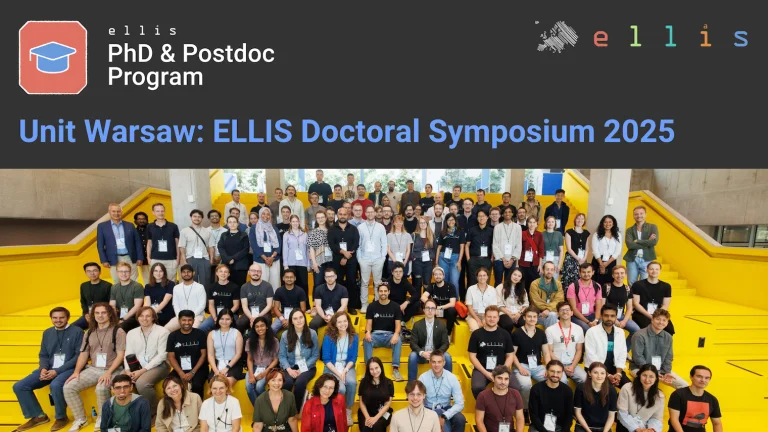



Bright Minds, Robust Ideas: EDS 2025 in Warsaw
Since its first edition in Tübingen (2021), EDS has grown into one of the key annual events within the ELLIS network, with subsequent editions held in Alicante (2022), Helsinki (2023), and Paris (2024). The Warsaw edition confirmed the symposium’s role as a vital meeting point for the next generation of AI researchers in Europe.
The event was organized by the ELLIS Unit Warsaw, operating at IDEAS Research Institute in Warsaw, with the University of Warsaw as co-organizer.
Keynotes and Panels
The symposium opened on Monday with a kick-off ceremony and a keynote by Petri Myllymäki (ELLIS Fellow, University of Helsinki) entitled “AI for the Good of Humankind”. This was followed by the panel discussion “Social Responsibility and Ethics in AI” featuring Petri Myllymäki, Paulina Tomaszewska (Warsaw University of Technology), Tuan Trinh (EIT Digital), and Ewa Dolińska-Wysocka (University of Silesia in Katowice), moderated by Alicja Ziarko (PhD Student at University of Warsaw).
Tuesday was dedicated to robotics. The day started with Dario Floreano’s (ELLIS Fellow, EPFL) keynote “Challenges and Opportunities for Robust AI in Biologically Inspired Drones”, followed by the panel “Rethinking AI Through the Lens of Robotics” with Dario Floreano, Davide Scaramuzza (ELLIS Fellow, University of Zurich), Philip Piatkiewicz (ADRA), and Krzysztof Walas (ELLIS Member, Poznan University of Technology) - moderated by Przemysław Kornatowski (WUT). Later in the afternoon, Davide Scaramuzza gave a keynote on “Vision Based Agile Robotics”. The day also included industry elevator pitches, the Academy & Industry Fair combined with a poster session, and concluded with a gala dinner at Warsaw’s historic Forteca. A special highlight of the day was awarding the robot from Leo Rover for the best robotics poster to Jan Węgrzynowski (Researcher at IDEAS Research Institute).
In the following days, participants attended a series of inspiring keynotes delivered by leading experts from across Europe. Ewa Szczurek (ELLIS Member, University of Warsaw) opened the Wednesday program with her talk “Generative AI for Molecule Discovery”, showcasing how artificial intelligence can accelerate innovation in the life sciences. She was followed by Pau Rodríguez López (ELLIS Member, Apple Machine Learning Research, UAB), who discussed new approaches to generative modeling in his lecture “From Experts to Distributions: Controlling Generative Models from Within.”
On Thursday, the focus shifted towards the societal and ethical dimensions of AI. Serge Belongie (ELLIS President, University of Copenhagen) explored the role of algorithms in shaping digital culture in his keynote “Narratives in the Modern Social Media Ecosystem.” Later that day, Nuria Oliver (ELLIS Vice-President, ELLIS Alicante) addressed pressing issues of fairness and inclusivity in her talk “Towards a Fairer World With AI.”
The final day of the symposium featured Alexandra Birch-Mayne (University of Edinburgh), who presented her research on robust natural language processing in multilingual contexts in a keynote entitled “Robust Multilingual NLP.” Her lecture highlighted both the challenges and opportunities of developing AI systems capable of working reliably across languages and cultures.
The program also featured thought-provoking panels, including “Being a Good Scientist – Prerequisite or a Doom to Become an Entrepreneur?” with Marek Cygan (ELLIS Member, University of Warsaw), Tomasz Trzciński (ELLIS Fellow, Director of ELLIS Unit Warsaw), Piotr Sankowski (ELLIS Fellow, University of Warsaw), and Pau Rodríguez López, moderated by Daniel Marczak (PhD Student at WUT).
Throughout the week, young researchers showcased their projects during poster sessions and spotlight presentations, fostering engaging scientific discussions and new collaborations. Among all the poster sessions not related to robotics, the jury awarded the prize, funded by the Embassy of Switzerland in Warsaw, to Olaf Dünkel (ELLIS PhD Student at Max Planck Institute for Informatics, University of Oxford).
In addition to the scientific program, participants had the opportunity to explore Warsaw, including a guided tour of the Old Town, allowing guests to experience the city’s cultural heritage.
A highlight of the symposium was the industry fair, where tech companies and start-ups presented their AI and robotics solutions, strengthening the dialogue between academia and the private sector.
Participants of EDS 2025 also had the opportunity to learn about funding schemes for research mobility grants, both within the framework of the EU Marie Skłodowska-Curie Actions and through the programs offered by the Polish National Agency for Academic Exchange (NAWA). The presentation was delivered by Marta Muter from NAWA’s Department of Programs for Scientists and MSCA National Contact Point.
Honorary Patrons and Sponsors
The symposium was held under the honorary patronage of:
Ministry of Digital Affairs of the Republic of Poland,
Ministry of Finance of the Republic of Poland,
Mayor of the Capital City of Warsaw,
Polish Tourism Organisation.
Sponsors and partners included: University of Warsaw, ML in PL, Embassy of Switzerland in Poland, ORLEN S.A., G-Research, Google, Edu4Industry, Adra (AI-Data-Robotics Association), Leo Rover, Bosch Magyarország, ELIAS – European Lighthouse of AI for Sustainability, and ELSA – European Lighthouse on Secure and Safe AI.
The Significance of EDS in the ELLIS Network
The ELLIS Doctoral Symposium is one of the flagship events of the ELLIS PhD & Postdoc Program, which connects Europe’s most talented young researchers in artificial intelligence. By bringing together early-career scientists and internationally recognized experts, the symposium strengthens the pan-European ELLIS network, fosters interdisciplinary collaboration, and supports the next generation of AI leaders. Each year, EDS not only provides advanced scientific training but also serves as a unique platform for community building and international exchange within the ELLIS ecosystem.
At the closing ceremony of EDS 2025, it was officially announced that the next edition, EDS 2026, will take place in Lisbon, Portugal.
Written by Artur Kołodziejczyk-Skowron, Unit Warsaw Coordinator
